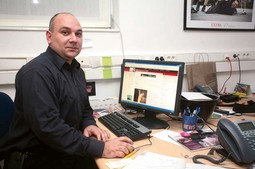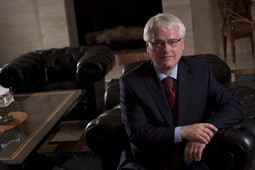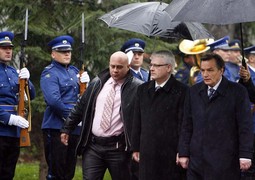IN A CREATIVE CONFLICT Josipovic describes his relations with Kosor as a 'creative conflict'Despite a stormy week in which he experiences one attack from the HDZ and government after another, on Sunday evening, Croatian President Ivo Josipovic gave off the impression of satisfaction. During the morning, he experienced, like his predecessor Stipe Mesic, an ovation from those gathered at the anniversary celebration of the penetration out of Jasenovac, while his rival Jadranka Kosor was booed, and he was particularly pleased at opinion polls stating that almost 60 percent of citizens supported his appearance in Sarajevo, where he apologised for Tudjman's policies towards Bosnia and Herzegovina. In the two months since his inauguration, Josipovic has already established himself as the most important politician in Croatia.
While the opposition is keeping quiet and waiting to see whether the HDZ government will cave in on itself, Ivo Josipovic has approached several important issues: from economic policy to the publication of the veteran's register, to the apology to the residents of BiH. Though his sixty days in office are too few to give a real assessment, it is already clear that he meant what he said in his campaign, when he claimed he would be a cactus, not a ficus. In this interview for Nacional, President Josipovic explains why he does not fear the HDZ's threats of impeachment and just how long the conflict with Kosor's government will last.
NACIONAL: Were you surprised over the storm of reactions to the statements you made in Sarajevo?
- I assumed that there would be reactions, but I was surprised when those reactions came from the government. I expected that the government would understand the strategic importance of my visit to Sarajevo, Ahmici and Krizancevo Selo, as these visits only benefit Croatia, which was seen in the support we received from the US and European Union. Most importantly, we also received the support of the citizens of Bosnia and Herzegovina, which is very important for the position of Croats in BiH, who are awaiting negotiations concerning the organisation of their country and the establishment of equality that they do not have today. Removing various war baggage is important for their position as the smallest, and with that, politically weakest nation. I am sorry the government did not recognise that.
NACIONAL: For what reasons?
- Perhaps out of fear of the unknown, or out of uncertainty regarding the next parliamentary elections in 2011. Proof that the government's position is wrong was seen in the public opinion poll, with a convincing 58 percent supporting my speech in Sarajevo, and only 13 percent undecided.
NACIONAL: Jadranka Kosor said that there would have been no problems had you consulted with the government prior to your visit to BiH. She also says that your advisor Josko Paro did not inform the government of your activities in BiH?
- That's not correct, as I was present when Paro called the government. Two days before the trip I personally called Premier Kosor and said it would be good for us to meet before I left. But you can be sure that it's just a formal issue as to who called whom, and that this is not the problem, just as it wasn't a problem when Premier Kosor did not inform me before going to Prague and meeting with President Obama, or to Bulgaria where she met with the state leadership. My entire trip to Sarajevo and Mostar was handled via the Ministry of Foreign Affairs and our embassy in Sarajevo, so via the government. And so then it cannot be true that someone says that they didn't know where we were going and what we would be doing. The problem is not a technical one, but a matter of essence. I would absolutely not allow anyone to revise my speeches, and that includes my speech before the BiH Parliament.
NACIONAL: The HDZ presidency believes that the Constitution entrusts the government and not the president with running the nation's foreign policy?
- HDZ can have any beliefs it wants, but the Constitution is clear. In foreign policy, I have at least equal authority as the premier.
NACIONAL: Are you satisfied with the way foreign policy is run now?
- I think it needs to be more active, which is what I showed in my visit. I would stress something else important that arose in my visit to BiH, and later in a trilateral meeting with the presidents of Hungary and Serbia. While we were returning, President Tadic and I stopped in Vojvodina and met with the Croat population there. For the Croats in that region, it was of immeasurable importance that they heard President Tadic call upon them to preserve their national identities, to send their children to Croatian schools, to learn and nurture the Croatian language and to certainly come out and vote in the minority elections. I consider that to be his great success, and my own as well.
NACIONAL: So you know the government resents your closeness with Tadic, and claim that you have spent more time with the Serbian president than you have with the Croatian premier?
- That is simply not true. I am always very happy to meet with Premier Kosor, and we speak very frequently. The best example of my attempts at cooperation are the calls I made to her before I left for Sarajevo. But the most important thing in my relations with the premier is that what we conclude in our meetings is then implemented. To date, we have had several meetings where we have agreed on many positive things, but very little has been realised. Fortunately, or unfortunately, the Office of the President does not have an operative role.
NACIONAL: How much can Boris Tadic be trusted? In his daily politics, he supports extremists such as Milorad Dodik.
- Of course, we need not agree on everything. What is most important is that Tadic very clearly stated that he does not support the breakup of Bosnia and Herzegovina and that he supports its integrity. It is very important that Serbia supports this position, and logical that there would be varying opinions as to its implementation. This is a topic of discussion for the three constitutive peoples, and I want to ensure the Croats the best possible starting position.
NACIONAL: Do you fear a possible impeachment?
- The most recent opinion polls show that I have large public support for my speech in Sarajevo. So, just let them try. When someone wants to take initiative, the responsibility for that move lies on their shoulders. Firstly, I don't believe that such an initiative could be successful, but imagine if it were, and I won again at new elections? Considering the public support I have, that would be a very real possibility.
NACIONAL: How do you perceive the accusations that you violated the Constitution?
- That's why I said that they should then go ahead with the impeachment procedure, because otherwise this is nothing but political delusions. If someone thinks that I violated the Constitution, then they are obliged to launch proceedings against me. Only, this includes great political responsibility if they want to destabilise the country by trying to replace the president. Then you have to accept the consequences. I couldn't force anyone to resign, even the premier, but that would be the political and moral responsibility of someone who launched such a procedure, regardless of whether that it Premier Kosor or someone else on the political scene. Otherwise, I believe that this story of violating the Constitution was served to the premier by those who are bothered by our interest in working well together and who seek some room for themselves in the midst of a conflict between us.
NACIONAL: Have you spoken with the premier today?
- No. Today we are honouring the victims of Jasenovac. But we did say that we would meet sometime this week.
NACIONAL: What is your opinion on the politics of Franjo Tudjman towards Bosnia and Herzegovina?
- Things are not all black and white. That was a time in which many great and positive things were going on, the most important of which was defending the country against aggression and creating the independent Croatian state. However, the policies towards BiH were not good, as they were ambivalent. On the one hand, Croatia helped BiH by taking in its refugees and carrying out joint military operations, but it did not prevent and instead it stimulated a conflict between the Croats and Bosnians. It sent Croats a latent message suggesting the Bosnia and Herzegovina was not their homeland. I think that such a policy greatly damaged the Croats, as they were not motivated in activities in the bodies of the Federation and Bosnia and Herzegovina, and now they have one last chance to achieve their equality. They truly don't have equality now, as they cannot, like the Serbs and Bosnians, participate in creating political decisions. That is why Croatia needs to stand behind their just attempts to create equality in the modern BiH.
NACIONAL: How much are Gojko Susak and his like-thinkers to blame for their status?
IVO JOSIPOVIC with President of the BiH Presidency Haris Silajdzic in Sarajevo- This was certainly a group of people who generated these policies, but as a practical politician, it's much less important for me to go back into history and look to see who is responsible for what. That's best left up to the historians, justice system and Hague Tribunal, which is establishing the responsibility for the crimes committed. For me, as a president who will be in a position to help the process of negotiations in BiH, it is more important to remove the problems that now exist at the political level.
NACIONAL: What did you discuss with Reisu-l-ulema Mustafa Ceric and Cardinal Vinko Puljic, who accompanied you in Ahmici and Krizancevo Selo?
- I expressed my deep respect to them both, as they showed the ability to rise up above daily politics, prejudices present within both nations and real burdens. The fact is that Reisu-l-ulema Ceric and Cardinal Puljic, together with me, appeared for the first time at the sites where Croats killed Bosnian civilians, and where Bosnians killed Croats. This shows the maturity of vision of the religious communities which are, in this case, above politics.
NACIONAL: Why didn't you stress Slobodan Milosevic as the main culprit? The right wing strongly resents you for that.
- It is pointless to constantly insist on rituals. Of course we know, and I know that Milosevic started all the wars in the former Yugoslavia and generated them towards Croatia and Bosnia and Herzegovina, that his politics were the mother of all crimes. Politicians need to send new messages, instead of constantly looking to the past. It was a little funny for me to hear accusations that I didn't mention the aggression against Croatia, that I was equalising guilt, when it all comes down to one thing: showing the lack of readiness and maturity of politicians, who fail to see that we need to turn over a new leaf, leave the war behind us and open new processes that will bring peace and prosperity, especially in Bosnia and Herzegovina.
NACIONAL: What is your opinion on the Declaration on the Homeland War? The HDZ claims that you violated the provisions of this document in which it states that Croatia exclusively fought a defensive war?
- The claim that I violated the Declaration is absolute nonsense, founded on a malicious interpretation of my speech. The Declaration on the Homeland War is a general political declaration which tells of the clear fact that Croatia led a legitimate and legally founded defensive war in defensive of its sovereignty. That claim is fabricated and political manipulation. I am actually enjoying watching Andrija Hebrang and some others arguing with themselves. First they are looking for hidden messages in my speech which no one else can see, and then arguing over them. That's just their way of getting media attention.
NACIONAL: What about your Economic Council? Its establishment aroused negative reactions in the government, as they are beginning to view you as the competition?
- The Council began working immediately, as it should have. It was wrong to expect that the Council would immediately come up with some new operative strategy and begin implementing it. We know that according to the Constitution, the government is responsible for running economic policy and I have no ambitions or objective possibilities to take over that task. I clearly stated that I have every right, and that I want to give proposals, suggestions, criticism. It's up to the government to accept or reject them. I don't know why the government attacked me for this on the very first day of my mandate, when they know what their job is. I want the Economic Council not only to help me form my position on economic issues, but to be a forum where we can discuss economic issues and create some positive positions. At the second session, we will talk concretely about attracting foreign investments, as this is the only way to open new jobs. We will present our conclusions to the government and the public.
NACIONAL: Are you at war with the government?
- I wouldn't call my mandate war. This is a phase of creative conflict on certain issues, which will bring forth ideas that the citizens support. I expected to have differences of opinion with the government, but what is important is that conflict does not paralyse politics or make life worse for our citizens, as both I and the government are here to serve the people. I don't think we've come to the point where we're too blind to see that our citizens are living very hard in this economic crisis, and many are unemployed. I truly want to cooperate with the government, as the Constitution requires us to do, and I'm sure that Premier Kosor wants the same.
'We need to release the register'
NACIONAL: Are you still in support of making the Veteran's Register public?
MARKO RAKAR, suspected by police of publishing the Veteran's Register- Well, that's what the people want. The fact is that some 80% of people want the register made public, and the same share of veterans themselves. That alone clearly shows what the government should do. It is absolutely, politically and in every other sense, a very important thing for Croatia. We need to change the law and then make it public, except for those data which could threaten someone's security. It is clear that no one can make the government do this, but they should be warned that the voters will pay very close attention at the next elections as to whether their will was respected or obstructed. You saw that the publication of the register was cause to attack me and via the attack against Marko Rakar, the construction that the Office of the President was to blame was constructed. The investigation showed that this was not the truth and I'm curious to see whether the media and politicians who attacked us will find the strength to apologize to Rakar and myself.
NACIONAL: Were Rakar's human rights violated?
- I can only rely on Rakar's statement that the police acted professionally. Whether or not they should have investigated him at all is another question.
NACIONAL: Have you spoken with Rakar in the meantime?
- We've exchanged emails in which he informed me that the entire procedure is now over, and that they found nothing to incriminate him. The Chief of Police said the same thing, and apologised in a way. That is good, because Marko Rakar deserves a very clear apology.
 MARKO RAKAR, suspected by police of publishing the Veteran's Register- Well, that's what the people want. The fact is that some 80% of people want the register made public, and the same share of veterans themselves. That alone clearly shows what the government should do. It is absolutely, politically and in every other sense, a very important thing for Croatia. We need to change the law and then make it public, except for those data which could threaten someone's security. It is clear that no one can make the government do this, but they should be warned that the voters will pay very close attention at the next elections as to whether their will was respected or obstructed. You saw that the publication of the register was cause to attack me and via the attack against Marko Rakar, the construction that the Office of the President was to blame was constructed. The investigation showed that this was not the truth and I'm curious to see whether the media and politicians who attacked us will find the strength to apologize to Rakar and myself.
MARKO RAKAR, suspected by police of publishing the Veteran's Register- Well, that's what the people want. The fact is that some 80% of people want the register made public, and the same share of veterans themselves. That alone clearly shows what the government should do. It is absolutely, politically and in every other sense, a very important thing for Croatia. We need to change the law and then make it public, except for those data which could threaten someone's security. It is clear that no one can make the government do this, but they should be warned that the voters will pay very close attention at the next elections as to whether their will was respected or obstructed. You saw that the publication of the register was cause to attack me and via the attack against Marko Rakar, the construction that the Office of the President was to blame was constructed. The investigation showed that this was not the truth and I'm curious to see whether the media and politicians who attacked us will find the strength to apologize to Rakar and myself.





